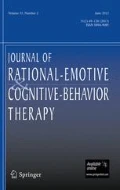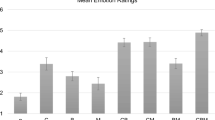Abstract
One study examined the hypothesized status of appraisal and irrational beliefs relative to attributions, as proximal antecedents of emotion. In our study, which looked at 4 pairs of functional and dysfunctional negative emotions (i.e., concern/anxiety, sadness/depression, remorse/guilt, annoyance/anger), undergraduates (N = 120) reported on their attributions, appraisal, irrational beliefs, and emotions during past encounters associated with various negative events. Congruent with both Smith and Lazarus' (1993) appraisal theory and Ellis' (1994) cognitive theory of emotion, the results of this study indicate that the emotions (both functional and dysfunctional negative emotions) were more directly associated with appraisal and with irrational beliefs (dysfunctional negative emotions only) than they were with attributions. Also, irrational beliefs were strongly associated with appraisal; while demandingness (DEM) was associated more with primary appraisal, awfulizing/catastrophizing, low frustration tolerance, and global evaluation of human worth (including self-downing) were associated more with secondary appraisal. Dysfunctional emotions seem to involve primary appraisal associated with DEM while functional emotions involve primary appraisal associated with preferences. These findings lend to support the status of appraisal and irrational beliefs as the proximal cognitive antecedents of emotion and the status of irrational beliefs as a differencing factor between functional and dysfunctional emotions.
Similar content being viewed by others
REFERENCES
Abelson, R. P., & Rosenberg, M. J. (1958). Symbolic psycho-logic: A model of attitudinal cognition. Behavioral Science, 3, 1-13.
Baron, R. M., & Kenny, D. A. (1986). The moderator-mediator variable distinction in social psychological research: Conceptual, strategic, and statistical considerations. Journal of Personality and Social Psychology, 51, 1173-1182.
Bernard, M. E. (1998). Validation of the general attitude and beliefs scale. Journal of Rational-Emotive & Cognitive-Behavior Therapy, 16, 183-196.
Bond, F. W., & Dryden, W. (1996). Testing an REBT theory: The effects of rational beliefs, irrational beliefs, and their control or certainty contents on the functionality of interference-II. In a personal context. International Journal of Psychotherapy, 1, 55-77.
Cannon, W. B. (1927). The James-Lange theory of emotions: a critical examination and an alternative theory. American Journal of Psychology, 39, 106-124.
Cash, T. F., Rimm, D. C., & MacKinnon, R. (1986). Rational-irrational beliefs and the effects of the Velten Mood Induction Procedure. Cognitive Therapy and Research, 10, 461-467.
Chang, E. C. (1997). Irrational beliefs and negative life stress: Testing a diathesis-stress model of depressive symptoms. Personality and Individual Differences, 22, 115-117.
Cramer, D., & Fong, J. (1991). Effect of rational and irrational beliefs on intensity and “inappropriateness” of feelings: A test of rational-emotive theory. Cognitive Therapy and Research, 15, 319-329.
David, D. (2000). Unconscious information processing. Cluj-Napoca, Dacia Press.
David, D. (in press). Rational Emotive Behavior Therapy; The view of a cognitive psychologist. In W. Dryden (Ed.), Theoretical developments in REBT, London, Brunner/Routledge.
Denoff, M. S. (1991). Irrational beliefs, situational attributions, and the coping responses of adolescent runaways. Journal of Rational-Emotive & Cognitive-Behavior Therapy, 9, 113-135.
DiGiuseppe, R. (1996). The nature of irrational and rational beliefs: progress in rational emotive behavior theory. Journal of Rational-Emotive & Cognitive-Behavior Therapy, 4, 5-28.
DiGiuseppe, R. (2001). Insight versus rehearsal in the development of new rational beliefs. Paper presented at The International Conference of REBT, Colorado, USA.
DiGiuseppe, R., Leaf, R., Exner, T., & Robin, M. (1988). The development of a measure of irrational/rational thinking. Paper presented at the World Congress of Behavior Therapy, Edinburg, Scotland.
Ekman, P. (1992). An argument for basic emotions. Cognition and Emotion, 6, 169-200.
Ellis, A. (1962). Reason and emotion in psychotherapy. New York: Stuart.
Ellis, A. (1994). Reason and emotion in psychotherapy (re. ed.). Secaucus, NJ: Birch Lane.
Ellis, A., & Dryden, W. (1997). The practice of rational emotive behavior therapy. New York, NY, US: Springer Publishing Co.
Ellis, A., & Harper, R. A. (1975). A new guide to rational living. North Hollywood, CA: Wilshire.
Engels, G. I., Garnefsky, N., & Diekstra, R. F. W. (1993). Efficacy of Rational-Emotive Therapy; A quantitative analysis. Journal of Consulting and Clinical Psychology, 61, 1083-1091.
Fiske, S. T. (1993). Social cognition and social perception. Annual Review of Psychology, 44, 155-194.
Fiske, S. T. & Taylor, S. E. (1991). Social Cognition, New York: McGraw-Hill.
Folkman, S., & Lazarus, R. (1988). Coping as a mediator of emotion. Journal of Personality and Social Psychology, 54, 466-475.
Harran, S. M., & Ziegler, D. J. (1991). Cognitive appraisal hassles in college students displaying high or low irrational beliefs. Journal of Rational-Emotive & Cognitive-Behavior Therapy, 9, 265-271.
Heppner, P.P., Reeder, B. L., & Larson, L. M. (1983). Cognitive variables associated with personal problem-solving appraisal: Implications for counseling. Journal of Counseling Psychology, 30, 537-545.
Kassinove, H., Eckhardt, C., Endes, R. (1993). Assessing the intensity of “appropriate” and “inappropriate” emotions in rational-emotional therapy. Journal of Cognitive Psychotherapy: International Quarterly, 7, 227-239.
Kombos, N. A., Foumet, G. P., & Estes, R. E. (1989). Effects of irrationality on a trail making performance task. Perceptual and Motor Skills, 68, 591-598.
Lazarus, R. S. (1968). Emotions and adaptation: conceptual and empirical relations. In W. J. Arnold (Ed.), Nebraska Symposium on Motivation, 16, 175-266. Lincoln: Nebraska University Press.
Lazarus, R. S. (1991). Emotion and adaptation. New York: Oxford University Press.
Lazarus, R. S. (1995). Cognition and emotion from the RET viewpoint. Journal of Rational-Emotive & Cognitive-Behavior Therapy, 13, 29-54.
Lazarus, R. S. (2001). Toward better research on stress and coping. American Psychologist, 55, 665-674.
LeDoux, J. E. (1996). The emotional brain: The mysterious underpinnings of emotional life. New York, US: Simon and Schuster.
Leventhal, H., & Tomarken, A. (1986). Emotion: today's problem. Annual Review of Psychology, 37, 565-610.
Malouff, J. M., Schutte, N. S., & McClelland, T. (1992). Examination of the relationship between irrational beliefs and state anxiety. Personality and Individual Differences, 13, 451-456.
Mandler, G. (1975). Mind and Emotion, New York: Wiley.
Master, S., & Gershman, L. (1983). Physiological responses to rational-emotive self-verbalizations. Journal of Behavior Therapy and Experimental Psychiatry, 14, 289-296.
McDermut, J. F., Haaga, A. A. F., & Bilek, L. A. (1997). Cognitive bias and irrational beliefs in major depression and dysphoria. Cognitive Therapy and Research, 21, 459-476.
Schachter, S., & Singer, J. E. (1962). Cognitive, social, and physiological determinants of emotional state. Psychological Review, 69, 379-399.
Schachter, S., & Singer, J. E. (1979). Comments on the Maslach and Marshall-Zimbarbo experiments. Journal of Personality and Social Psychology, 37, 989-995.
Sinclair, R. C., Hoffman, C., Mark, M., Martin, L., & Pickering, T. (1994). Construct Accessibility and the Misattribution of Arousal: Schachter and Singer Revisited. Psychological Science, 5, 123-132.
Smith, C. A., Haynes, K. N., Lazarus, R. S., & Pope, L. K. (1993). In search of the “hot” cognitions: Attributions, appraisals and their relation to emotion. Journal of Personality and Social Psychology, 65, 916-929.
Smith, C. A., & Lazarus, R. (1993). Appraisal components, core relational theme, and the emotions. Cognition and Emotion, 7, 233-269.
Still, A. (2001). Marginalisation is not unbearable. Is it even undesirable? Journal of Rational-Emotive & Cognitive-Behavior Therapy, 19, 55-66.
Tobacyk, J. J., & Downs, A. (1986). Personal construct threat and irrational beliefs as cognitive predictors of increases in musical performance anxiety. Journal of Personality and Social Psychology, 51, 779-782.
Walen, S. R., DiGiuseppe, R., & Dryden, W. (1992). A practitioner's guide to rational-emotive therapy (2nd ed.). New York, NY, US: Oxford University Press.
Weiner, B. (1985). An attributional theory of motivation and emotion. New York: Springer-Verlag.
Ziegler, D. J. (2001). The possible place of cognitive appraisal in the ABC model underlying Rational Emotive Behavior Therapy. Journal of Rational-Emotive & Cognitive-Behavior Therapy, 19, 137-152.
Author information
Authors and Affiliations
Rights and permissions
About this article
Cite this article
David, D., Schnur, J. & Belloiu, A. Another Search for the “Hot” Cognitions: Appraisal, Irrational Beliefs, Attributions, and Their Relation to Emotion. Journal of Rational-Emotive & Cognitive-Behavior Therapy 20, 93–131 (2002). https://doi.org/10.1023/A:1019876601693
Issue Date:
DOI: https://doi.org/10.1023/A:1019876601693




